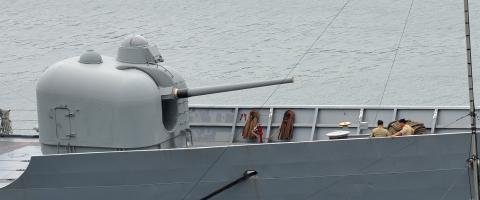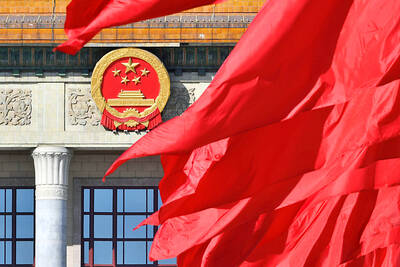The balance of power in the Taiwan Strait is rapidly shifting in Beijing’s favor, the Ministry of National Defense said in this year’s National Defense Report released yesterday, adding that China’s People’s Liberation Army (PLA) could blockade Taiwan and seize its outlying islands by 2020.
The report said the PLA aimed to be able to launch a full-scale military attack against Taiwan by 2020 and it was developing the capabilities necessary to prevent foreign forces from intervening on Taiwan’s behalf.
China plans to launch its first indigenous aircraft carrier in 2020 and to deploy stealth fighters on it, the report said.

Photo: AFP
The PLA’s Beidou navigation satellite system, which will greatly enhance precision-strike capabilities, is also scheduled for completion by 2020, it said.
The report said “the gap in national defense budgets between both sides is widening, with China’s military budget 21 times that of Taiwan’s, while China’s military spending is now second only to the US globally.”
The report said China’s declared defense budget last year was US$77 billion, dwarfing Taiwan’s US$9 billion military budget. However, the actual Chinese military budget might have exceeded US$200 billion, which would provide Beijing with a dollar-for-dollar advantage of more than 20-to-one, it said.
The report said that in the 20 years to 2009, China’s military spending had maintained double-digit growth nearly every year, with total spending ranking first in Asia, threatening other countries in the region.
China’s official military spending this year is budgeted at US$93 billion, the report said, citing official Chinese statistics. The PLA has more than 2.3 million personnel, against 270,000 in Taiwan, or a -ratio of nine to one, it said.
The report said China had deployed a small number of Dong-Feng 21D “carrier killer” ballistic missiles last year, which could threaten aircraft carriers, the main platform the US would likely use if it intervened in any future conflict in the Taiwan Strait.
China has deployed more than 1,000 missiles along its southeastern coast targeting Taiwan, while intensely building air defense and anti-ship bases along the coast.
Advanced weapons systems are deployed in Fujian and Guangdong provinces, with an emphasis on strengthening long-range force projection capabilities.
“This indicates that the Chinese communists have not altered their thinking of [posing a] military threat and invasion,” it said.
Regarding the PLA Air Force, it said China’s new-generation combat aircraft are deployed at bases in Fujian and Guangdong, which are equipped with long-range air-defense systems.
Long-range anti-ship missiles are deployed on ships at bases in the southeast and new-type missile boats are also operational there, the report said.
Chinese unmanned aerial vehicles and high-speed anti-radiation missiles are capable of attacking Taiwan’s command-and-control bases, it said.
As the military imbalance between Taiwan and China continues to expand, Taiwan is developing asymmetric warfare capabilities and strengthening its conventional forces to meet the challenge, the report said.
Commenting on the report, Democratic Progressive Party (DPP) lawmakers said it was evidence that cross-strait military imbalance had grown rapidly since President Ma Ying-jeou (馬英九) took power in 2008.
Taiwan’s military spending has fallen well short of the 3 percent of GDP that Ma had promised. The national defense budget this year accounts for just 2.2 percent of GDP, a five-year low.
A lack of funding and major new weapons purchases have undermined Taiwan’s defensive capabilities, DPP Legislator Tsai Huang-liang (蔡煌瑯) said.
“Reducing our military manpower and the budget is an indirect surrender to [China],” DPP Legislator Chen Ming-wen (陳明文) said.
ADDITIONAL REPORTING BY VINCENT Y. CHAO, AP AND AFP

US PUBLICATION: The results indicated a change in attitude after a 2023 survey showed 55 percent supported full-scale war to achieve unification, the report said More than half of Chinese were against the use of force to unify with Taiwan under any circumstances, a survey conducted by the Atlanta, Georgia-based Carter Center and Emory University found. The survey results, which were released on Wednesday in a report titled “Sovereignty, Security, & US-China Relations: Chinese Public Opinion,” showed that 55.1 percent of respondents agreed or somewhat agreed that “the Taiwan problem should not be resolved using force under any circumstances,” while 24.5 percent “strongly” or “somewhat” disagreed with the statement. The results indicated a change in attitude after a survey published in “Assessing Public Support for (Non)Peaceful Unification

The CIA has a message for Chinese government officials worried about their place in Chinese President Xi Jinping’s (習近平) government: Come work with us. The agency released two Mandarin-language videos on social media on Thursday inviting disgruntled officials to contact the CIA. The recruitment videos posted on YouTube and X racked up more than 5 million views combined in their first day. The outreach comes as CIA Director John Ratcliffe has vowed to boost the agency’s use of intelligence from human sources and its focus on China, which has recently targeted US officials with its own espionage operations. The videos are “aimed at

SECURITY: Grassroots civil servants would only need to disclose their travel, while those who have access to classified information would be subject to stricter regulations The government is considering requiring legislators and elected officials to obtain prior approval before traveling to China to prevent Chinese infiltration, an official familiar with national security said yesterday. President William Lai (賴清德) in March announced 17 measures to counter China’s growing infiltration efforts, including requiring all civil servants to make trips to China more transparent so they can be held publicly accountable. The official said that the government is considering amending the Act Governing Relations Between the People of the Taiwan Area and Mainland Area (臺灣地區與大陸地區人民關係條例) to require all civil servants to follow strict regulations before traveling to China.

‘MISGUIDED EDICT’: Two US representatives warned that Somalia’s passport move could result in severe retaliatory consequences and urged it to reverse its decision Minister of Foreign Affairs Lin Chia-lung (林佳龍) has ordered that a special project be launched to counter China’s “legal warfare” distorting UN Resolution 2758, a foreign affairs official said yesterday. Somalia’s Civil Aviation Authority on Wednesday cited UN Resolution 2758 and Mogadishu’s compliance with the “one China” principle as it banned people from entering or transiting in the African nation using Taiwanese passports or other Taiwanese travel documents. The International Air Transport Association’s system shows that Taiwanese passport holders cannot enter Somalia or transit there. The Ministry of Foreign Affairs (MOFA) protested the move and warned Taiwanese against traveling to Somalia or Somaliland